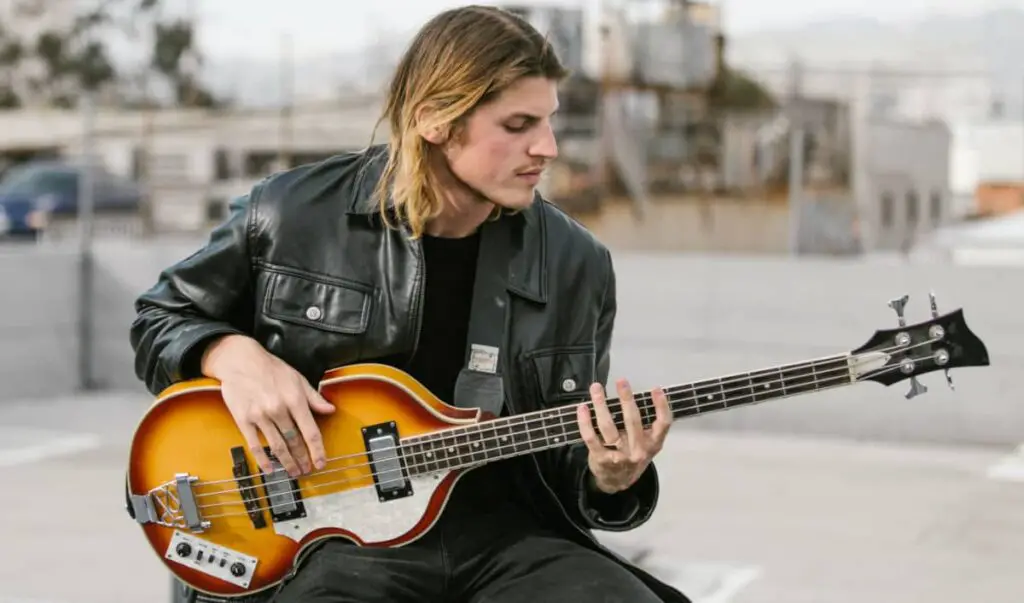When starting out as a bassist, the sheer size of the instrument can be intimidating. It feels much bigger on your body than a guitar, and reaching notes on the fretboard is difficult. One way to resolve this problem is to simply play a smaller bass. But is this the ideal solution for a beginner, and should you start on a short-scale bass?
The short-scale is a great bass to start on, especially for children and people with small hands. The shorter distance between frets gives you great control over your fretting hand and the lower string tension makes it easier to fret strings than on the standard-sized 34″ bass.
Not only is a short-scale bass great to start with. It can also be a great bass to play for life. Many bassists have played short scales professionally, some of whom have made the switch to it from the standard-sized bass.
But are short-scale basses that much easier to play? How do they sound compared to standard-sized basses, and are they good instruments overall?
I`ve answered all of these questions below. Thus, after reading this article you will have a clear idea of whether starting on a short-scale bass is the right decision for you or not.
Is a short-scale bass easier to play?
While the playability of a bass depends on personal preference and physicality, short-scale basses are generally easier to play than standard-sized basses. While plucking strings is similar, playing a bass with a shorter-scale length will be less demanding for your fretting hand.
Long-scale basses have a scale length of 34″ (86cm). Short-scale basses are dimensionally smaller, and have a scale length of 31″ (79cm) or less. Most commonly, they have a scale length of 28.6″ (73cm) or 30″ (76cm).
There are also exists “Medium-sized” basses that are 32″ (81cm).
Guitars generally have a scale length of 25.5″ (65cm). Thus, If you are familiar with playing guitar, a shorter-scale length will make it easier to transition to playing the bass. This is because your muscle memory will be much better adjusted to a short scale.
The short-scale bass is also great to start on if you are still growing, have small hands, or find the the long-scale bass too big. In time, you can make a decision on whether you want to continue playing a short scale or move on to a standard-sized bass.
If you are fully grown and find playing the standard-sized bass uncomfortable, starting with a short-scale bass is a good idea. Furthermore, it’s unlikely that you will have much reason to ever switch from it to a standard-sized bass.
If you want to start on the short-scale in order to switch to a 34″ later on, you can. However, in this case, I recommend starting on the standard-sized bass immediately.
This is because playing a short-scale will only help slightly in getting used to a larger bass. You will still need to get used to the 34″ at a later point, but now you also need to readjust your muscle memory.

Are short-scale bass guitars any good?
Short-scale basses are good instruments, and most models are crafted by reputable manufacturers. Among others, Fender, Ibanez, and Epiphone all produce short-scale basses that hold a similar quality to that of their standard-sized basses.
The short-scale bass is not in any way a less serious instrument than the 34″. While it is suitable for children, it is also a legitimate instrument that can be used for anything the standard bass is used for.
There are also multiple bassists that have had great careers playing short scales, which speaks volumes about the quality of the instrument. Here are some of the most notable ones:
- Paul McCartney – The Beatles
- Phil Lesh – The Grateful Dead
- Jack Bruce – Cream
- Bill Wyman – The Rolling Stones
- Jack Casady – Jefferson Airplane
- Allen Woody – Allman Bros
- Glenn Cornick – Jethro Tull
The difference in tone between standard-sized basses and short scales varies greatly on the model and manufacturer of the instrument. Wood type, string gauge, string wounding, pickups, and action will all affect the tone. Thus, the scale length is just one of many factors that will determine what your bass is going to sound like.
With that said, short-scale basses generally have a deeper and darker tone with a focused low end. Thus, they are great for playing deep and heavy basslines and are great at filling the low-end when playing with a band. Standard basses have a more concentrated mid-range, and thus generally have a more nuanced sound.
The best short-scale bass for beginners
The best all-around short-scale for beginners is the 28.6″ (73cm) Ibanez GSRM20. In addition to its short-scale length, its versatile sound, playability, and cost-effectiveness make it the perfect short-scale bass for beginners.
When buying your first instrument, it’s best to aim for a quality instrument without unnecessary intermediate features. You also want an instrument that allows you to explore different tones, and develop your own style.
Thus, if you are buying your first bass and are looking for a short-scale I Recommend the Ibanez GSRM20 (Amazon link.)
It has a J-style and a P-style pickup, which gives you great tonal flexibility. This means you have a lot of room to find a bass tone that fits your style and that can be played in multiple genres.
The GSRM20 also has a great low-end sound and a fretboard that allows for fluid playing. In other words, it gives you exactly what you’d want when choosing a short-scale bass over a standard-sized one.
The 28.6″ scale length also makes it suitable for children and for guitar players who are making the switch to the bass.
Conclusion
Short-scale basses are great for beginners. They are also great for intermediate and professional bassists.
While starting on a short-scale bass can make it easier to pick up the bass, it is generally better to start with a standard-sized bass if you intend to switch to a 34″ later on anyway.
Furthermore, If you prefer the short-scale there is nothing wrong with sticking with it. It worked well for Paul McCartney, who is not only the most successful bassist but the most successful rock musician in modern times.
Fretting notes will be easier due to the lower string tension on the short scale. Unless you have large hands, it will also be easier to reach notes due to frets being closer together. The short-scale also has a more focused low-end than standard basses.
Thus, Whether you should start on a short scale depends on your physiology, comfort with the instrument, and tone preference. A smaller bass is not a shortcut to learning the bass faster. It is merely a more suitable instrument choice for some.
While on the subject of scale length, I have also written about why basses are so long here. The article showcases why basses need to be bigger than guitars, and what gets sacrificed when their size is reduced.

